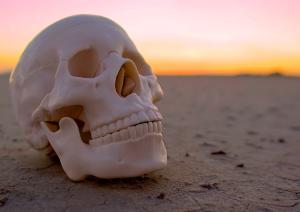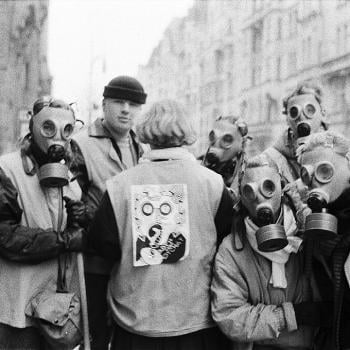
The mythic stories recorded in Genesis, however one interprets or reads them in regards to history, should still be used to teach Christians many lessons such as the idea that humanity is called to take care of and protect the earth. Humanity was given stewardship over the earth, not so that they can exploit it and use it for their every whim, but to preserve it, protecting those living on it from needless harm. If they fail that, that is, if they, in their actions, harm the world and those living on it, they will risk losing everything. Is that not one of the principles we should learn from the story of Noah? To be sure, the story of Noah also teaches us something else – that even when our sins have caused unconscionable havoc upon the earth, there is hope; we can still change our ways, and in doing so, help bring healing to the world around us. Indeed, if we treat Noah as an exemplar of righteousness, we should learn the protection and preservation of all forms of life is one our missions in life. If and when human evil threatens the existence of all life on earth, we must do what we can to make sure the threat is not turned into a reality, that is, we must make sure that life as we know it is not wiped out of existence. Noah and his family are righteous because they took on the duty the rest of humanity would not do, and in this way, they followed after God and, with God’s grace, made sure human depravity, with the destruction it brings in its wake, did not have the last say.
Sadly, humanity, and Christians especially, seem to have lost sight of their obligation to the earth. Instead of doing what they can to preserve and protect life on earth, they continue to engage actions with threaten to bring everything into a final, tragic end. There are all kinds of signs we are heading towards a mass extinction event upon the earth. More and more scientists are observing the large number of species of life going extinct, the way human activity has caused this, and the threat which lies ahead of us, the threat of a sixth “mass extinction event” upon the world, if humanity does not shape up and correct its course:
Unlike previous extinction events caused by natural phenomena, the sixth mass extinction is driven by human activity, primarily (though not limited to) the unsustainable use of land, water and energy use, and climate change. Currently, 40% of all land has been converted for food production. Agriculture is also responsible for 90% of global deforestation and accounts for 70% of the planet’s freshwater use, devastating the species that inhabit those places by significantly altering their habitats. It’s evident that where and how food is produced is one of the biggest human-caused threats to species extinction and our ecosystems.[1]
And, while many do not want to hear it, the size of the human population, and how humanity preserves that population, is a major contributor to the problem: “This is due to overpopulation – currently, earth’s population is 8 billion – loss of resources, and animals and wild plants running out of places to live.”[2]
It is true, throughout history, various species of life have been wiped out of existence. Again, some of that is due to human activity, and we should not take it for granted that it was a good thing. Nonetheless, what happened in the past is far different from what is happening now, for we see the rate of extinction is around “100 times the rate typically observed in Earth’s history.”[3] Those who want to treat the issue with a shrug, saying that species are always dying out, that climate always changes, are saying such things as an excuse to ignore their responsibility to the world; it would be like Cain saying to God, not only he is not his brother’s keeper, but that death is a part of humanity, so it doesn’t matter that Abel died. The reality is that, unlike what Cain suggests, we are meant to act, not only as our “brother’s keeper,” but as protector of the earth itself. Not only have we failed to meet our responsibility, we have made things worse, and the more we ignore our responsibility and try to ignore the damage which we have caused, the worse things are becoming. We can no longer disregard the signs which stand before us. There is still time to preserve the earth, to turn back the damage we have caused it, and to find a way to bring species back from the edge of extinction. And, as Pope Francis indicated, we should not play favorites, looking to those species which we like and preserve them while ignoring others which we do not like, because the world is interdependent, and the biosphere needs a wide variety and diversity of species:
It may well disturb us to learn of the extinction of mammals or birds, since they are more visible. But the good functioning of ecosystems also requires fungi, algae, worms, insects, reptiles and an innumerable variety of microorganisms. Some less numerous species, although generally unseen, nonetheless play a critical role in maintaining the equilibrium of a particular place. [4]
We must take into consideration the world as a whole, and not just our own immediate desires and needs. This means we must understand the impact of our infrastructure on the world, making sure that we take into consideration all the species we might harm, displace, or destroy as a result of our actions, and do what we can to limit such harm, if not counteract it:
Highways, new plantations, the fencing-off of certain areas, the damming of water sources, and similar developments, crowd out natural habitats and, at times, break them up in such a way that animal populations can no longer migrate or roam freely. As a result, some species face extinction. Alternatives exist which at least lessen the impact of these projects, like the creation of biological corridors, but few countries demonstrate such concern and foresight.[5]
We might even have to consider whether or not some of the things we want to do should be postponed or denied until we can find a better way to do them. If we don’t, we might cause permanent, devasting harm to the world we live on. We must not let impatience for the fulfillment of our personal desires rule our decision. Perhaps we should consider what is going on around us is similar to what was said to be happening around Noah, leading us to treat the world as Noah treated the ark. In doing so, we should realize, just as Noah did, that our actions should be all about preparing for our immediate future, so that we can get through the worst elements of it, making sure that everyone and everything will have a future when the crisis which stands before us today is overcome. Certainly Noah had to forgo all kinds of associations and activities in order to follow God’s directives in his life, and so we, too, realizing our duty to the earth, as well as the immediate need which lies before us, must be willing to do similar; we can no longer selfishly exploit the earth, putting off to tomorrow what is necessary today.
We must take seriously all the ways our actions threaten the world, and acknowledge what that must mean for our lives. We are going to see the impact of what we have done for a long time, if, that is, we survive. We are going to see the impact of it in a variety of ways, some which will be in relation to the environment and all those other beings living in it, but some of it will also be close to home, as we will have to deal with the way environmental disasters impact humanity as a whole. For example, we will see (indeed, we have begun to see), “environmental refugees,” people migrating around the world, looking for a place to thrive, once their own land has been made incapable of supporting them If we truly promote and support the dignity of all human life, we must act, helping such refugees, as Pope Benedict XVI indicated:
Can we remain indifferent before the problems associated with such realities as climate change, desertification, the deterioration and loss of productivity in vast agricultural areas, the pollution of rivers and aquifers, the loss of biodiversity, the increase of natural catastrophes and the deforestation of equatorial and tropical regions? Can we disregard the growing phenomenon of “environmental refugees”, people who are forced by the degradation of their natural habitat to forsake it – and often their possessions as well – in order to face the dangers and uncertainties of forced displacement? Can we remain impassive in the face of actual and potential conflicts involving access to natural resources? All these are issues with a profound impact on the exercise of human rights, such as the right to life, food, health and development. [6]
We are at a crisis point in world history. If we are not careful, we will end up destroying most, if not all, of the forms of life which are currently live on the earth. This must not be our legacy. This must not be the end. We still have time. We still can correct our course. But the time we have left to do so is limited. The words of Pope Benedict XVI represents what we must do if we are to make proper use of that time:
Humanity needs a profound cultural renewal; it needs to rediscover those values which can serve as the solid basis for building a brighter future for all. Our present crises – be they economic, food-related, environmental or social – are ultimately also moral crises, and all of them are interrelated. They require us to rethink the path which we are travelling together. Specifically, they call for a lifestyle marked by sobriety and solidarity, with new rules and forms of engagement, one which focuses confidently and courageously on strategies that actually work, while decisively rejecting those that have failed. Only in this way can the current crisis become an opportunity for discernment and new strategic planning. [7]
We must change our ways. We must accept the consequences of our past actions require us to restructure how we act in the world. We are responsible for what is happening. There is hope. We can look upon the example of Noah and use him to represent what we must do now. We must prepare the way for the future. We must focus our attention on the existential threat which lies before it is too late. Otherwise, the threat of mass extinction will become a reality, and with it, we might find humanity’s place in world history will also come to an end.
[1] World Wildlife Fund, “What Is The Sixth Mass Extinction And What Can We Do About it?”
[2] Jona Jaupi, “DOOMSDAY WARNING Civilization As We Know It ‘Is Ending’ And Humans Could Face Biggest Extinction Event Since Dinosaurs, Scientists Warn,” in The US Sun (1-4-2023).
[3] Ibid., quoting Tony Barnosky.
[4] Pope Francis, Laudato si’. Vatican translation. ¶34.
[5] Pope Francis, Laudato si’,¶35.
[6] Pope Benedict XVI, “Message For the 43rd World Day of Peace” (1-10-2010). Vatican translation. ¶4.
[7] Pope Benedict XVI, “Message For the 43rd World Day of Peace,” ¶5.
Stay in touch! Like A Little Bit of Nothing on Facebook.
If you liked what you read, please consider sharing it with your friends and family!
N.B.: While I read comments to moderate them, I rarely respond to them. If I don’t respond to your comment directly, don’t assume I am unthankful for it. I appreciate it. But I want readers to feel free to ask questions, and hopefully, dialogue with each other. I have shared what I wanted to say, though some responses will get a brief reply by me, or, if I find it interesting and something I can engage fully, as the foundation for another post. I have had many posts inspired or improved upon thanks to my readers.













